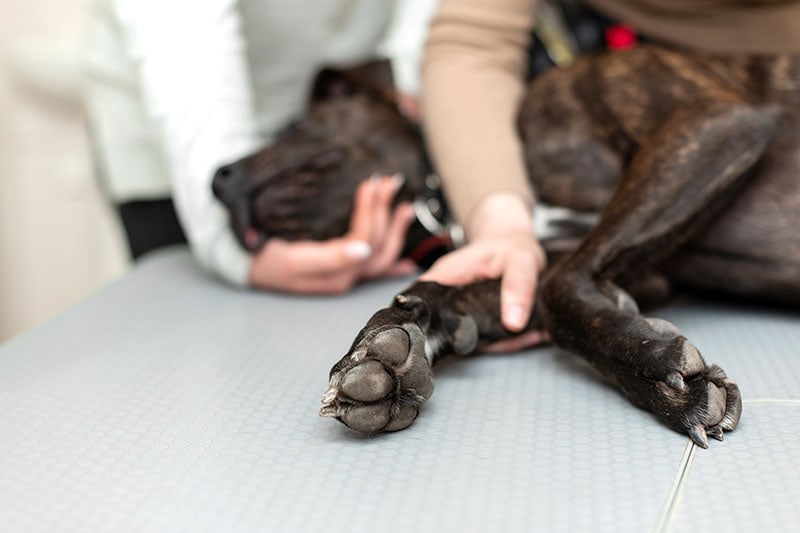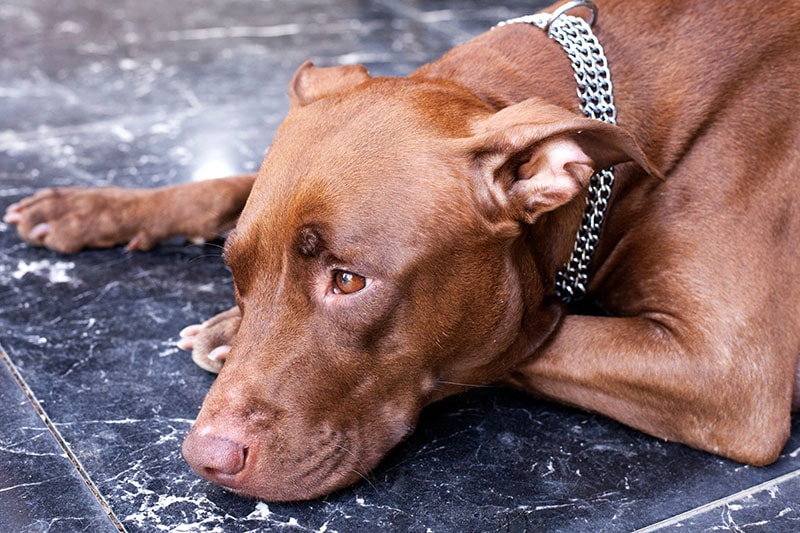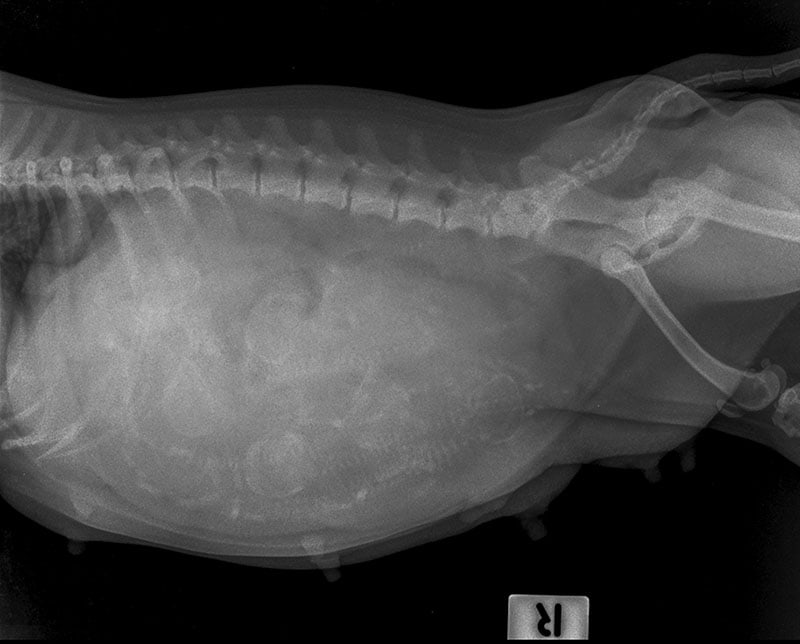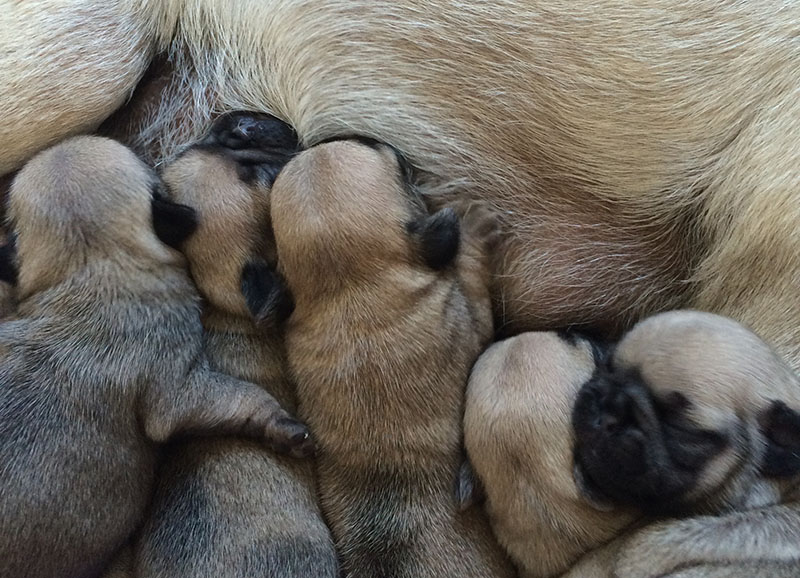For most Pit Bull parents, nothing is more exciting than welcoming their puppies into the world. However, owners whose Pit Bull breeds are pregnant for the first time or those considering breeding their Pit Bull may have many questions about the pregnancy.
Pregnancy in most dogs, including Pit Bull breeds, lasts around 2 months, from 57–65 days, though it can be challenging to determine the precise delivery time, particularly if the mating date is not known.
To get the best chance of a smooth pregnancy and your Pit Bull being ready for her due date, read on to discover more about Pit Bull pregnancy, from the appropriate time for your Pit Bull to get pregnant to how long the pregnancy lasts and its stages.
What’s the Appropriate Age for Your Pit Bull to Get Pregnant?
Female Pit Bulls have their first heat cycle once they reach puberty, typically around 6–9 months. However, that is the worst time for your dog to get pregnant. Your Pit Bull is still considered a puppy at six months old, and her body is not developed enough to bring puppies into the world safely.
Most Pit Bulls are more fertile during their adult years when they are older than 12–15 months. However, it is best to breed female dogs that are 2–7 years old. Most breeds experience heat twice a year, so you’ll have plenty of time to breed your Pit Bull if they are deemed adequate for breeding based on their ancestry, health, and character.
You should consult your vet before considering breeding your dog, as this is a big responsibility and should not be taken lightly. Numerous recommended health tests will ensure breeding your dog is safe. If there are any doubts, it is best not to proceed with breeding, particularly considering the millions of dogs that enter U.S. shelters each year.

The Signs of Pregnancy in Pit Bulls Breeds
If you’ve had your Pit Bull go through the mating process, there’s a big possibility that pregnancy will occur. Therefore, you need to know how to recognize the signs of pregnancy in Pit Bull breeds. However, it’s still very important to take your dog in for a vet check-up so that you can discuss preventative health care, vaccination programs, nutrition, pregnancy, whelping, and the raising of puppies.
Signs that your Pit Bull is pregnant include:
- Appetite increase
- Nipple size increase
- Weight gain
- Less active
- Tires more easily
- Swollen belly
- Changes in behavior
- More affectionate
- Showcases nesting behavior
- Vomiting
- Decreased appetite during the first few weeks
By noticing these signs in your Pit Bull, you can determine your canine may be pregnant, but you will not know for sure, particularly in the early stages. However, some health problems could cause similar signs, so it’s best to contact your vet if you notice any of them.
How Can You Confirm Your Pit Bull’s Pregnancy?
There’s no such thing as pregnancy test kits for dogs, which is why you’ll need other methods to confirm your Pit Bull’s pregnancy.
The best way to know if your Pit Bull is pregnant is to take her to the vet, who will then perform one of the following methods to confirm the pregnancy:
- Ultrasound
- Hormone testing
- Palpation
- X-ray

How Long Does a Pit Bull Pregnancy Last?
Pit Bull pregnancy lasts around 2 months, generally between 62–64 days, but it can be anywhere between 57–65 days. Veterinarians can’t always determine the precise due date since the time of mating doesn’t necessarily match the time of ovulation and conception.
The best way to track your Pit Bull’s pregnancy and know what’s going on is to take her to the vet a month after the breeding. However, if you are planning on breeding your dog, it’s essential to consult your vet well in advance of mating to make a plan for the pregnancy and whelping. There are vital requirements and recommendations regarding vaccinations, de-worming, flea treatment, and nutrition to ensure a safe and healthy pregnancy and raising healthy puppies.
PangoVet. It’s an online service where you can <b>talk to a vet online</b> and get the personalized advice you need for your pet — all at an affordable price!
</p>
<div class="su-button-center"><a href=https://www.dogster.com/dog-health-care/"https://pangovet.com/?utm_source=dogster&utm_medium=article&utm_campaign=dog_preventative_wellness%22 class="su-button su-button-style-default" style="color:#FFFFFF;background-color:#FF6600;border-color:#cc5200;border-radius:9px;-moz-border-radius:9px;-webkit-border-radius:9px" target="_blank" rel="nofollow"><span style="color:#FFFFFF;padding:0px 24px;font-size:18px;line-height:36px;border-color:#ff944d;border-radius:9px;-moz-border-radius:9px;-webkit-border-radius:9px;text-shadow:none;-moz-text-shadow:none;-webkit-text-shadow:none"> Click to Speak With a Vet</span></a></div></div></div>"}" data-sheets-userformat="{"2":513,"3":{"1":0},"12":0}" data-sheets-validation-definition="{"1":{"1":{"1":23,"2":[{"1":1,"3":{"1":{"1":[{"1":4,"6":1},{"1":1,"2":"="}]},"2":{"1":[{"1":2,"2":"="},{"1":3,"3":1}]},"3":"R1]S"},"4":[{"1":{"1":0,"2":20,"3":0,"4":1,"5":2236944,"6":"841046713"},"2":1}]}],"6":[{"1":{"2":{"1":2,"2":"❤️ Preventative wellness"}},"2":{"1":2,"2":676776},"3":{"1":2,"2":12574966}},{"1":{"2":{"1":2,"2":"🤮 Vomiting"}},"2":{"1":2,"2":676776},"3":{"1":2,"2":12574966}},{"1":{"2":{"1":2,"2":"🛡️ Flea & tick"}},"2":{"1":2,"2":676776},"3":{"1":2,"2":12574966}},{"1":{"2":{"1":2,"2":"🍎 Ate or drank"}},"2":{"1":2,"2":676776},"3":{"1":2,"2":12574966}},{"1":{"2":{"1":2,"2":"🐕 Behavior & training"}},"2":{"1":2,"2":676776},"3":{"1":2,"2":12574966}},{"1":{"2":{"1":2,"2":"👁️ Eye issues"}},"2":{"1":2,"2":676776},"3":{"1":2,"2":12574966}},{"1":{"2":{"1":2,"2":"⚠️ Urinary problems"}},"2":{"1":2,"2":676776},"3":{"1":2,"2":12574966}},{"1":{"2":{"1":2,"2":"🩺 Other"}},"2":{"1":2,"2":676776},"3":{"1":2,"2":12574966}}]},"2":{"1":{"1":[{"1":4,"6":0},{"1":4,"6":1},{"1":2,"3":"CONDITION_ONE_OF_RANGE","4":2},{"1":1,"2":"="}]},"3":"R0]R1]FCONDITION_ONE_OF_RANGE:2]S"},"3":[{"1":{"1":0,"2":1,"3":0,"4":1,"5":1118464},"2":0},{"1":{"1":0,"2":20,"3":0,"4":1,"5":2236944,"6":"841046713"},"2":1}]},"2":"","3":1,"4":1,"6":0}" data-sheets-validation-id="0"> If you need to speak with a vet but can’t get to one, head over to PangoVet. It’s an online service where you can talk to a vet online and get the personalized advice you need for your pet — all at an affordable price!

Pit Bull Pregnancy Stages
You can follow your Pit Bull’s pregnancy through all its stages and prepare your dog to welcome puppies to the world. Your Pit Bull will go through eight stages before the delivery time.
Week 1
The first week during Pit Bull pregnancy is when the breeding and possible fertilization occur. Remember that the conception and breeding days will likely mismatch, which may affect the precise delivery date for your canine.
After fertilization, the embryo will travel down the uterus, and by the end of this week, the pregnancy will take root on the uterine wall, but there will be no changes in your Pit Bull’s appearance or behavior.
Week 2
The developing embryo is safely implanted and doesn’t need much, so don’t change the diet just yet. Your dog will still look and behave the same during this stage of pregnancy.
The only noticeable difference some dogs may experience is decreased appetite and vomiting. You can carefully groom them to reduce stress.
Week 3
At this stage of your Pit Bull’s pregnancy, the embryos are embedded in the wall of the uterus, gaining shape and enabling the growing puppies to get nutrients from their mother.
The third week is still too early to confirm the pregnancy, so you can wait a bit longer before taking your Pit Bull to the vet for further testing.
Week 4
Week four represents an exciting turnaround in your Pit Bull’s pregnancy because that’s when much of the development begins. There is a head, the eyes, and the first vertebrae. By this stage, the fetus has nearly tripled and developed its organs.
This week is a good time to take your Pit Bull to the vet to confirm the pregnancy, as the fetal heartbeat can be seen during the ultrasound, and your vet can gently feel the sacs when feeling your dog’s abdomen.
The vet may be able to determine a possible estimate for the delivery time, as dog pregnancies last between 62 and 64 days. However, they won’t be able to determine an exact date, so you should start preparing for the puppies.

Week 5
During week five, the puppies in your Pit Bull’s tummy grow more and more, and the space around them starts to fill with amniotic fluid that protects them. In this stage, the puppies will also slowly start growing their teeth, nails, and whiskers.
You’ll likely notice your Pit Bull gaining weight, and she may experience an increased appetite. The developing puppies also start to increase their weight gain.
Week 6
During week six, it will be extremely easy to notice that your Pit Bull is pregnant, even if you’ve never seen a pregnant dog before. She will gain weight, have a large belly, and have swollen, dark nipples.
Most Pit Bulls become less active this week, and they require more food than usual to support their body and the development of the puppies inside the uterus. At this stage, the puppies will have developed sex organs, start to grow fur, and get the pigments and markings that will determine how each puppy will look once born.

Week 7
Starting week seven, you should prepare for the arrival of your new Pit Bull puppies and create a designated whelping area for your dog. You’ll likely need to get your Pit Bull used to using the area and try to encourage nesting behavior.
Your pregnant Pit Bull will likely eat large amounts of food during this period and may be more affectionate and irritable than usual. At this point, the puppies’ skeletons are fully developed, and the due date will be approaching quickly.
Week 8
Many female Pit Bulls tend to become distant during this week as they’re preparing to give birth and may feel more tired or reluctant to move around too much. The mammary glands are becoming pronounced at this time, and the nipples may begin to release milk in this last week before whelping, although this is more common 3–5 days before the due date.
Week 9
By this point, your Pit Bull could go into labor at any moment. You should prepare everything and provide a safe, clean, and comfortable space where your dog can give birth. When labor starts, remember to remain calm and try to help your dog in any way until the labor is over. Monitor them closely and seek veterinary assistance in case of any doubts or problems.
It’s wise to regularly measure your dog’s rectal temperature during the last 2 weeks of pregnancy. The reason for this is to recognize the beginning of the first stage of labor, characterized by a temporary drop in temperature from more than 100 degrees Fahrenheit to 98 or 99 degrees. This indicates that labor will begin within the next 24 hours.

How to Care for a Pregnant Pit Bull
The issues that you’ll need to pay attention to during your Pit Bull’s pregnancy to ensure that you’re properly taking care of your furry friend include:
- Nutrition — Your Pit Bull will need proper nutrition and high-quality foods throughout the pregnancy to remain healthy and provide enough nutrients to the puppies. Her appetite will increase as the pregnancy progresses, and she will become heavier. The food intake should increase in the last third of pregnancy. You can speak to your vet about the best choice of premium foods intended for pregnancy and lactation formulated in accordance with AAFCO guidelines.
- Exercise — You should minimize exercise if your Pit Bull is pregnant. She will likely be tired and lack energy because the growing puppies are consuming a lot of her nutrients and minerals.
- Vet visits — Even before breeding your Pit Bull, it’s a good idea to take her to the vet and ensure that everything is okay with her health and whether she is suitable for breeding in the first place.
Final Thoughts
Pit Bulls are typically pregnant for 2 months or between 62 and 64 days. However, the due date may vary, as ovulation and fertilization may not occur at the same time as the breeding.
To be sure you’re prepared for the arrival of the puppies, be ready for labor starting by the end of week eight. Pit Bulls may give birth anywhere between the end of week eight and week nine, which is something to keep in mind. Speak to your vet well in advance of the pregnancy, and familiarize yourself with the signs of labor and expected complications so that you can recognize them early and seek veterinary assistance.
- See Also: When Does a Pitbull Go into Heat
Featured Image Credit: otsphoto, Shutterstock












